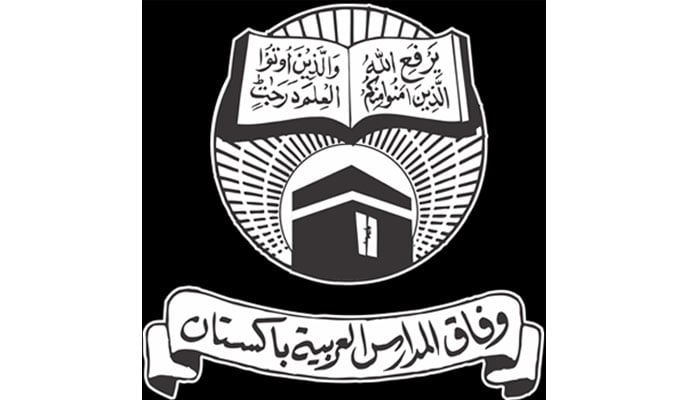Wafaq-ul-Madaris hints at resuming teaching activities
Although the authorities are yet to announce a policy for reopening of the educational institutions and form SOPs in this regard, the Wafaq-ul-Madaris Al-Arabia Pakistan, the country’s largest religious education board, in a meeting held on Thursday hinted at starting the admission process for the new academic year on June 2 and resuming on-campus curriculum activities from June 12.
The board, which belongs to the Deobandi school of thought, in its meeting also decided that an official announcement for reopening of the seminaries would be made after a meeting of the Ittehad-e-Tanzeemate-Madaris Pakistan (ITMP). However, the date of the ITMP’s meeting was not mentioned in the press statement issued by the board on Thursday.
According to the board, in the first phase, religious scholars will highlight the importance of religious education in Friday sermons and will communicate their point of view to the leaders and representatives of private schools, political parties, tuition centres and business communities.
“Due to the discriminative policies and dual standards, we are not demanding anything from the government. But recommendations for the reopening of the seminaries will be discussed with top religious scholars, leaders of the religious political parties, and administrators of seminaries,” the statement reads.
The meeting also raised questions over reopening of the business activities, asking that if the government could allow markets to open and let “a religious sect hold processions”, why authorities insisted on “us keeping the seminaries closed”.
“For the reopening of the seminaries, the scholars on the same pattern have developed SOPs which were earlier followed when the government allowed imams to open mosques,” it said. The participants of the meeting said all precautionary measures would be followed to avoid the spread of coronavirus, and students would be asked to follow SOPs.
Meanwhile, the spokesperson of the Jamia Binoria Al-Aalmia in a press statement said the institute would provide online admission applications on June 3, while the decision for the commencement of regular classes would be made after a decision was made by Wafaq-ul Madaris Al-Arabia Pakistan.
According to the spokesperson, in a meeting chaired by Mufti Muhammad Naeem, matters related to the new academic year and admissions were discussed.
On the occasion, Naeem said that by keeping the seminaries closed, the authorities were just wasting the precious time of students. He demanded of the government to allow the reopening of the madrasas with implantation of strict SOPs which would be followed by the students and the teachers.
He said madrasas would start their academic year in June every year. “But this year, students are anxious about their admission and completion of courses.” He said a further extension in the lockdown would be “more harmful than coronavirus” because the government has no alternative plan for education.
He said the countries which were still having a lockdown were providing relief and facilities to their citizens. He said the coronavirus pandemic had not affected Pakistanis as much it did to the citizens of other countries as they were “not following precautionary measures”. He said it was “very important to review policies and make the right decision”.
-
 Hong Kong Court Sentences Media Tycoon Jimmy Lai To 20-years: Full List Of Charges Explained
Hong Kong Court Sentences Media Tycoon Jimmy Lai To 20-years: Full List Of Charges Explained -
 Coffee Reduces Cancer Risk, Research Suggests
Coffee Reduces Cancer Risk, Research Suggests -
 Katie Price Defends Marriage To Lee Andrews After Receiving Multiple Warnings
Katie Price Defends Marriage To Lee Andrews After Receiving Multiple Warnings -
 Seahawks Super Bowl Victory Parade 2026: Schedule, Route & Seattle Celebration Plans
Seahawks Super Bowl Victory Parade 2026: Schedule, Route & Seattle Celebration Plans -
 Keto Diet Emerges As Key To Alzheimer's Cure
Keto Diet Emerges As Key To Alzheimer's Cure -
 Chris Brown Reacts To Bad Bunny's Super Bowl LX Halftime Performance
Chris Brown Reacts To Bad Bunny's Super Bowl LX Halftime Performance -
 Trump Passes Verdict On Bad Bunny’s Super Bowl Halftime Show
Trump Passes Verdict On Bad Bunny’s Super Bowl Halftime Show -
 Super Bowl 2026 Live: Seahawks Defeat Patriots 29-13 To Win Super Bowl LX
Super Bowl 2026 Live: Seahawks Defeat Patriots 29-13 To Win Super Bowl LX -
 Kim Kardashian And Lewis Hamilton Make First Public Appearance As A Couple At Super Bowl 2026
Kim Kardashian And Lewis Hamilton Make First Public Appearance As A Couple At Super Bowl 2026 -
 Romeo And Cruz Beckham Subtly Roast Brooklyn With New Family Tattoos
Romeo And Cruz Beckham Subtly Roast Brooklyn With New Family Tattoos -
 Meghan Markle Called Out For Unturthful Comment About Queen Curtsy
Meghan Markle Called Out For Unturthful Comment About Queen Curtsy -
 Bad Bunny Headlines Super Bowl With Hits, Dancers And Celebrity Guests
Bad Bunny Headlines Super Bowl With Hits, Dancers And Celebrity Guests -
 Insiders Weigh In On Kim Kardashian And Lewis Hamilton's Relationship
Insiders Weigh In On Kim Kardashian And Lewis Hamilton's Relationship -
 Prince William, Kate Middleton Private Time At Posh French Location Laid Bare
Prince William, Kate Middleton Private Time At Posh French Location Laid Bare -
 Stefon Diggs Family Explained: How Many Children The Patriots Star Has And With Whom
Stefon Diggs Family Explained: How Many Children The Patriots Star Has And With Whom -
 ‘Narcissist’ Andrew Still Feels ‘invincible’ After Exile
‘Narcissist’ Andrew Still Feels ‘invincible’ After Exile




